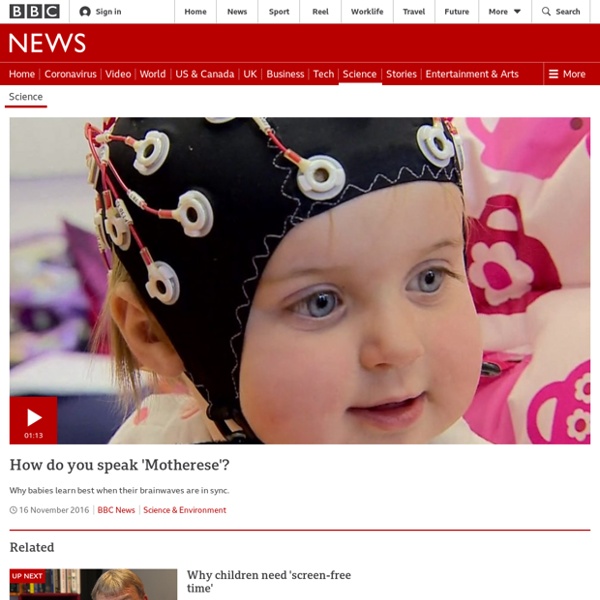



https://www.bbc.com/news/av/science-environment-38007057
Related: Language acquisition in early childhood • tetkol • ENGLISH IN EARLY CHILDHOODThe Power of Evening Routines The word “structure” can evoke less than positive associations. It suggests constraints, which are never a good thing, right? Wrong. MIT Brain Study: Back-And-Forth Talk Key To Developing Kids' Verbal Skills New MIT research finds that for children's brain development, parents don't just need to talk to their kids — it's important to talk with them, in back-and-forth exchanges. "What we found is, the more often parents engaged in back-and-forth conversation with their child, the stronger was the brain response in the front of the brain to language," said cognitive neuroscience professor John Gabrieli. Story continues below Most Viewed Stories
Early Years Training and Coaching I was introduced to Mine Conkbayir when she contacted me about neuroscience informing early years practice, which I think is such an exciting, and growing, area of study. So I was very enthusiastic when she offered to do a guest post on this subject. Here she discusses how neuroscience can add another dimension to our understanding of child development: Like many individuals in this increasingly frantic world, I’m often busy juggling my responsibilities as a parent while I work and continue my studies – a very exciting journey as I try to achieve my PhD in early childhood education and neuroscience.
The Brain-Changing Power of Conversation The Science Researchers used highly faithful audio recorders — a system called Language Environment Analysis (known as LENA) — to capture every word spoken or heard by 36 4–6 year olds from various socioeconomic backgrounds over two full days. The recordings were analyzed to measure the number of words spoken by each child, the number of words spoken to each child, and the number of conversational turns — back-and-forth exchanges initiated by either adult or child. Comparing those measurements with brain scans of the individual children, the analysis found that differences in the number of conversational turns accounted for differences in brain physiology, as well as for differences in language skills including vocabulary, grammar, and verbal reasoning. Read the MIT News story for a fuller summary of the research. The Takeaways
Being Multilingual: You speak with an accent. I don’t. Accents are things that only other people have. They are, by extension, things that you don’t want to have. Accents are, in short, shortcomings. Sound Words: Examples of Onomatopoeia Onomatopoeia is a fun, linguistic tool used in literature, songs and advertisements. Now that you've seen examples of the individual words, consider the following examples of onomatopoeia words in use. Take a look at the different onomatopoeia examples in Todd Rundgren's song, appropriately named Onomatopoeia. "Onomatopoeia every time I see yaMy senses tell me hubbaAnd I just can't disagree.I get a feeling in my heart that I can't describe. . .It's sort of whack, whir, wheeze, whineSputter, splat, squirt, scrapeClink, clank, clunk, clatterCrash, bang, beep, buzzRing, rip, roar, retchTwang, toot, tinkle, thudPop, plop, plunk, powSnort, snuck, sniff, smackScreech, splash, squish, squeakJingle, rattle, squeal, boingHonk, hoot, hack, belch."
FAQ: Raising Bilingual Children Why want bilingual children? There are many reasons, but the two most common are: 1) The parents speak different languages (say, an American woman and a Turkish man). Ten ways to support your child’s English-learning at home As the British Council opens a new Learning Time with Shaun & Timmy centre in Mexico for two- to six-year-olds, senior teacher Sarah Reid offers some useful tips for supporting your child’s learning at home. More and more parents want their children to learn English from a young age. I often meet parents of children as young as two or three who say that proficiency in speaking English will help their child 'get ahead in a globalised world'.